រាជបណ្ឌិត្យសភាកម្ពុជា
Royal Academy of Cambodia
Royal Academy of Cambodia
Cambodia has a long history of academic excellence and a rich cultural legacy. The nation's academic community has, however, been dealing with an unparalleled problem in recent years. With decreasing student enrollment, a dearth of skilled teachers, and significant financial struggles at many universities and colleges, the situation is grim. The quality of education has significantly decreased as a result of this problem, endangering the future of the nation's youth.
Many individuals are concerned about the quality of the educational system in Cambodia today. Many obstacles still exist despite government efforts to raise educational standards. The lack of resources is one of the main issues facing the Cambodian educational system. Many educational institutions are underfunded and lack essential resources like textbooks, computers, and classrooms. This makes it challenging for teachers to provide their students with a high-quality education.
The lack of skilled teachers is another problem. There is a significant turnover rate among teachers in Cambodia because they are frequently underpaid and inadequately qualified. Students aren't getting the education they need to succeed in life because there aren't enough skilled teachers teaching them.
In addition, the central government controls a significant amount of the education system in Cambodia. This has led to a lack of adaptation and flexibility in the system, making it challenging to meet the shifting demands of students and society.
Despite these difficulties, the educational system in Cambodia has made some progress. The government has started a number of programs to raise the standard of education, such as raising teacher pay, constructing new schools, and offering scholarships to kids from underprivileged backgrounds.
The educational system in Cambodia is currently in a mixed situation. Although there are many obstacles to overcome, certain encouraging developments offer optimism for the future. It is possible to raise the standard of instruction and provide Cambodian students the resources they need to be successful in life by addressing the root causes of the educational system's problems and putting sensible remedies in place.
The lack of finance for education in Cambodia is yet another significant problem. The government only devotes a small fraction of its budget to education, which leaves colleges and universities with inadequate funding, and the underpaid professors.
A brain drain has also resulted from the lack of academic independence in Cambodia, with many of the nation's top scholars and researchers leaving for better chances elsewhere. This has exacerbated the academic problem in Cambodia by creating a shortage of qualified teachers and researchers.
It is obvious that a variety of intricate and interconnected elements are at play in the academic crisis in Cambodia. The solution to these problems will include a multifaceted strategy that includes governmental reform, improved educational funding, and a dedication to academic freedom and human rights. Only then will the school system in Cambodia be able to reach its full potential and help the nation advance.
Proposed solutions for the crisis
The current academic crisis in Cambodia has raised concerns throughout the academic world. Policymakers, academic institutions, and other stakeholders must pay immediate attention to the crisis and take immediate action. Here are some suggestions for how to deal with the crisis:
1. Increase money: Increasing money for universities and research institutions is one of the most important remedies to the academic crisis in Cambodia. Increased money may contribute to higher-quality infrastructure, research facilities, and educational programs.
2. Encourage Collaboration: Encouraging collaboration between universities and research institutions can help in sharing resources, knowledge, and expertise. Collaboration can help in improving the quality of research and education in the country.
3. Improve Teacher Training: Improving teacher training is critical to improving the quality of education in Cambodia. Providing teachers with the necessary skills, knowledge, and resources can help in improving their teaching effectiveness and student learning outcomes.
4. Enhance Curriculum: Enhancing the curriculum to meet the current needs of the job market can help in improving the employability of graduates. The curriculum should be designed to provide students with the necessary skills and knowledge required to succeed in their future careers.
5. Address Corruption: Addressing corruption in the education system is critical to improving the quality of education in Cambodia. Measures should be taken to ensure that corruption is eliminated and that academic institutions are run transparently and efficiently.
By implementing these proposed solutions, the crisis in Cambodian academics can be addressed, and the academic community can work towards rebuilding the education system for a better future.
————
Dr. Seun Sam is a policy analyst of the Royal Academy of Cambodia.
 ថ្ងៃពុធ, 28 មិថុនា 2023 ម៉ោង 11:27 AM
ថ្ងៃពុធ, 28 មិថុនា 2023 ម៉ោង 11:27 AM
China and Cambodia, two countries with intricate geopolitical linkages and rich cultural traditions, have recently gained attention for their expanding economic and political ties. Although China has made significant investments in the infrastructure and economy of Cambodia, some observers are concerned that the country's growing reliance on China will result in a loss of sovereignty and lead to conflicts with its neighbors. This article will look at the connection between China and Cambodia's history, how it stands now, and if the two countries are allies or foes. This article also aims to look at what this might imply for the stability of the area and the economy of Cambodia.
Introduction to Cambodia and China's Connection
The ancient Khmer Empire is the origin of the long-standing link between China and Cambodia. In more recent times, a complex combination of political, economic, and strategic considerations has defined the relationship between the two nations.
China has become Cambodia's biggest economic partner and foreign investor during the previous ten years. The strategic location of Cambodia on China's Belt and Road Initiative (BRI), a vast infrastructure development project with the goal of connecting China with the rest of Asia, Europe, and Africa, has made this economic alliance possible.
The partnership between Cambodia and China does, however, face certain difficulties. Some Cambodians are worried about Chinese economic dominance and the possibility of exploitation due to their country's growing economic dependence on China. Concerns exist on how Chinese investment may affect Cambodia's ecology and natural resources.
Additionally, Cambodia's close ties to China have caused it to have a tense relationship with other nations in the region, especially the United States and its allies. The human rights record of Cambodia has been attacked, and the country has been charged with being a client state of China.
The relationship between China and Cambodia is intricate and multifaceted overall, with both shared and opposing viewpoints. Anyone interested in the geopolitics of Southeast Asia and the larger Indo-Pacific region must comprehend this relationship.
The Relationship between China and Cambodia in historical background
Century-long and intricate history may be found in the relationship between China and Cambodia. China and Cambodia have long-standing diplomatic ties and a shared cultural and historical background. The Khmer Empire, which ruled over Cambodia in the 13th century, was a major force in Southeast Asia and had close ties to China's Yuan Dynasty. With Cambodia acting as a tributary state to China under the Ming and Qing dynasties.
The turbulent past of Cambodia has affected its connection with China in recent times. China kept funding and investing in initiatives for infrastructure and development in Cambodia over the ensuing decades. China is currently Cambodia's top foreign investor and assistance donor, and the Belt and Road Initiative has strengthened economic connections between the two nations.
The relationship between Cambodia and China has not been without difficulties, though. The international community has recently criticized Cambodia for its close ties to China and alleged disrespect for democratic values and human rights. As a result, there are now a number of countries in the region, especially those with close relations to the United States, that are at odds with Cambodia. Despite these difficulties, the connection between Cambodia and China continues to be intricate and crucial to regional politics and growth.
The current state of Cambodia-China relations
There is a lot of discussion and controversy about the state of relations between China and Cambodia right now. Since the Khmer Rouge era, when China gave the Cambodian government financial and military support, the two countries have enjoyed a close relationship. But in recent years, the two nations' ties have deepened as a result of China's significant economic and infrastructure investments in Cambodia.
Some view this as a positive development, claiming that Chinese investment has assisted in boosting Cambodia's economy and lowering poverty. Others, though, are worried that Chinese influence could erode Cambodia's democracy and sovereignty. Chinese investment has been linked to claims of human rights violations, and some people are concerned that Cambodia may become unduly dependent on China, endangering its long-term political and economic stability.
Despite these reservations, the government of Cambodia has kept a close relationship with China, with Prime Minister Hun Sen openly admiring China's leadership and governmental practices. Some have concluded from this that Cambodia may be enlarging its connection with China at the detriment of its ties to other nations in the region and beyond. Although it is yet unclear how Cambodia-China ties will develop, it is obvious that this topic will continue to be a top concern for experts and policymakers in the years to come.
Cambodia's economic dependence on China
The subject of Cambodia's economic dependency on China has generated a lot of discussion in recent years. The major source of foreign aid and investment for Cambodia is now China, and the two nations have developed strong economic ties. While some contend that this dependence is advantageous, others are worried about the hazards and outcomes that could result.
On the one hand, China's investments and assistance have fueled economic growth in Cambodia. Chinese investment has brought new economic projects and infrastructure to the nation, boosting employment and raising living standards for many Cambodians. Additionally, China has contributed funding to support a range of social and economic initiatives, including those aimed at eradicating poverty and improving healthcare and education. These initiatives have improved access to essential services and decreased poverty in Cambodia.
There are worries that Cambodia's long-term economic reliance on China may have adverse effects on the country. Chinese investments, according to critics, frequently have conditions attached, such as political sway or ownership of vital assets. There are also worries about how some of China's infrastructure projects may affect the environment, which have come under fire for being unsustainable and harmful to natural resources.
In addition, others fear that Cambodia's reliance on China for its economic needs may leave it open to political or economic pressure from Beijing. Some worry that Cambodia could end up being used as a pawn in bigger geopolitical conflicts between China and other nations, like the United States, as China's influence in the region develops.
Overall, despite certain advantages, Cambodia's economic dependency on China is a complex subject with unknown risks and repercussions. It will be crucial to carefully assess the potential effects as Cambodia navigates its relationship with China and to try to make sure that its economic growth is sustainable and advantageous for all Cambodians.
China's strategic interests in Cambodia
China has a wide range of strategic interests in Cambodia. China's Belt and Road Initiative (BRI), a significant infrastructure and investment initiative intended to connect China with Asia, Europe, and Africa, counts Cambodia as a vital participant. China has made significant investments in the construction of roads, bridges, trains, and ports in Cambodia in order to facilitate the movement of people and products due to the country's advantageous location along the Mekong River.
The greatest investor in Cambodia is likewise China, which contributes money to a variety of development initiatives in the nation, including the construction of hydropower dams, special economic zones, and housing constructions. The energy, telecommunications, and construction industries of Cambodia are heavily populated by Chinese businesses. China is also Cambodia's greatest commercial partner, making up roughly a third of all commerce.
China views Cambodia as a crucial ally in its ambitions to strengthen its influence in Southeast Asia and balance the influence of the United States and other regional nations, in addition to its economic objectives. In international debates involving concerns like democracy and human rights, Cambodia frequently sides with China and has been a vociferous backer of China's territorial claims in the South China Sea.
In general, China's strategic interests in Cambodia are intricate and multifaceted, reflecting both political and economic factors. While China's investments and presence in Cambodia have benefited both nations significantly, they have also sparked worries about how Chinese influence can threaten Cambodia's independence and sovereignty.
The balancing act Cambodia must do with China and other regional powers
Cambodia is always a small nation with a rich past. The nation has seen several changes in recent years as a result of the fast growth of its economy and the influx of foreign capital. Due to its advantageous geographic position, the nation is now a significant participant in the region and has successfully used this advantage to maintain a delicate balance with China and other regional powers.
On the one hand, Cambodia has been a steadfast ally of China, with Chinese investments contributing significantly to the growth of the nation's economy. China has made significant infrastructure investments in the nation and has been a significant source of financial support for the government of Cambodia.
However, Cambodia has also taken care to avoid offending other regional superpowers like the US and Japan. By maintaining a policy of neutrality and non-alignment, the nation has been able to carefully maintain a balance between its relations with China and those with other regional powers.
The recent rise in hostilities between China and other regional nations has made things difficult for Cambodia. It desires to keep good relations with China but also does not want to be viewed as a pawn in a bigger geopolitical game. As a result, Cambodia has taken care to walk a fine line, avoiding taking sides and upholding its neutrality stance.
Overall, Cambodia must carefully navigate its delicate balancing act with China and other regional countries in the years to come. However, the nation is positioned to play a more significant role in the region because to its advantageous location and expanding economy.
Geopolitical Implications of Cambodia-China Ties
China has emerged as Cambodia's major foreign donor and investor in recent years, strengthening the country's connection with China. Cambodia has demonstrated its support for Chinese regional policies and initiatives, such as the disputes over the South China Sea. This has caused several of Cambodia's neighbors and other nations in the region to express concern as they worry that China's expanding influence could threaten regional stability.
Some have also questioned whether Cambodia is turning into a pawn in China's efforts to increase its influence in Southeast Asia in light of the improving ties between the two countries. It is important to note, though, that Cambodia has also attempted to strike a balance in its interactions with other superpowers like Japan, the US, and India.
How other nations in the region react will have a significant influence on how Cambodia-China relations affect regional geopolitics. If they believe that Cambodia is too strongly allied with China, they can try to counteract this by fostering closer ties with other big nations.
Alternatively, if they consider Cambodia as a possible friend, they might work to strengthen their own ties with it in an effort to balance off China's influence. In the end, Southeast Asia's geopolitical landscape is intricate and ever-changing, and Cambodia's relationship with China is but one component of it.
The role of the United States in relations between China and Cambodia
Over the years, the United States has had a big impact on relations between Cambodia and China. The US had historically played a significant role in Cambodian politics, supporting and aiding it during the Vietnam War. But as the Khmer Rouge regime fell, the US started to scale back its presence in Cambodia, leaving a political vacuum that China was more than happy to fill.
Since then, ties between the US and Cambodia have remained fairly tense, particularly under the current administration of Cambodia and the US. Prime Minister Hun Sen has accused the US of interfering in Cambodian affairs, the US has criticized Hun Sen's government for its record on human rights and its crackdown on opposition parties.
China, on the other hand, has given Hun Sen's administration more backing and made significant investments in Cambodia's economy and infrastructure. Some people are now worried that China's influence in the region is expanding and that Cambodia is becoming too dependent on it.
Despite this, the US continues to play a significant role in the region and has continued to support Cambodia with aid, albeit at a lower level. It remains to be seen if the US can continue to exert influence in Cambodia while curbing China's expanding dominance in the area.
Conflict between China and Cambodia could happen
There are worries about the possibility of confrontation between China and Cambodia as their connection continues to grow. China has made significant investments in Cambodia's economy and infrastructure, which have benefited the nation greatly. Some academics are concerned that Cambodia's increasing reliance on China may result in the loss of its sovereignty and independence.
China's influence over Cambodia's political system is one area of concern. The Cambodian People's Party, which is currently in power, has strong relations to China and has received a lot of backing from Beijing over the years. Criticisms of the Cambodian government's growing authoritarianism and lack of accountability to its people have resulted from this.
China's persistent territorial disputes in the South China Sea could also lead to violence. The Association of Southeast Asian Nations (ASEAN), which includes Cambodia's neighbors, has appealed for a peaceful resolution to the conflict, although Cambodia has generally taken the side of China on this issue.
It's crucial to remember that Cambodia and China have a long history of diplomatic and economic cooperation despite these worries. Strong relationships benefit both nations greatly, and there are numerous areas where cooperation is possible. Furthermore, Cambodia has demonstrated a readiness to balance its connections with China by pursuing tighter ties with nations like Japan and India.
In conclusion, it's critical to take a balanced approach to the situation even though there are hazards connected to Cambodia's close ties to China. There are advantages and disadvantages in every relationship, and it is the responsibility of leaders on both sides to manage the complicated dynamics and keep the partnership moving in the right direction.
Conclusion and the Future of relations between Cambodia and China
In conclusion, there is a complicated connection between China and Cambodia that is both an ally and a foe. China provides economic assistance and investment to Cambodia, as well as backing on the global stage, notably in relation to the South China Sea dispute. Concerns concerning Cambodia's sovereignty and its capacity to pursue a separate foreign policy have arisen as a result of the nation's excessive reliance on China.
Recent events suggest that the partnership will endure, such as Cambodia's support of China's territorial ambitions and rising Chinese investment. The younger generation in particular is showing symptoms of increased hostility against Chinese influence, which may cause the nation's foreign policy to change in the future.
The balance of power in the region, the resolution of the South China Sea issue, and the shifting opinions of the Cambodian populace will all likely have an impact on how Cambodia and China interact in the future. The leaders of Cambodia will have to carefully strike a balance between their relations with China and their determination to uphold their country's sovereignty and independence, all the while taking the concerns of the Cambodian populace into account. Relations between Cambodia and China will ultimately be determined by the choices taken by their respective governments as well as their capacity to cooperate to achieve their shared objectives.
In conclusion, it should be noted that China and Cambodia have a complicated relationship that has developed over time. Although China has historically provided economic and military support to Cambodia, there are growing worries about the possible effects of China's growing influence in the region. It will be intriguing to see how both nations' strategic and economic objectives converge or diverge in the future as they work to navigate their relationship.
-----------------------
Dr. Seun Sam is a policy analyst at the Royal Academy of Cambodia. All views in this article are his own.
 ថ្ងៃសៅរ៍, 24 មិថុនា 2023 ម៉ោង 09:39 AM
ថ្ងៃសៅរ៍, 24 មិថុនា 2023 ម៉ោង 09:39 AM
កាលពីព្រឹកថ្ងៃព្រហស្បត្តិ៍ ៥កើត ខែបឋមាសាឍ ឆ្នាំថោះ បញ្ចស័ក ព.ស. ២៥៦៧ ត្រូវនឹងថ្ងៃទី២២ ខែមិថុនា ឆ្នាំ២០២៣ វេលាម៉ោង ០៩:៣០នាទី ឯកឧត្តមបណ្ឌិត យង់ ពៅ អគ្គលេខាធិការនៃរាជបណ្ឌិត្យសភាកម្ពុជា តំណាងឯកឧត្ដមបណ្ឌិតសភាចារ្យ សុខ ទូច ប្រធានរាជបណ្ឌិត្យសភាកម្ពុជា បានដឹកនាំសហការី ទទួលជំនួបក្នុងអង្គប្រជុំជាមួយក្រុមហ៊ុន EMCAST កូរ៉េ ក្នុងគោលបំណងដើម្បីស្វែងរកលទ្ធភាពក្នុងការសហការគ្នាបង្កើតមជ្ឈមណ្ឌលបណ្តុះបណ្តាលបច្ចេកវិទ្យា AI ដល់និស្សិត បុគ្គលិករដ្ឋ ឯកជន ឬអង្គការនានា ដែលមានបំណងចង់ប្រើប្រាស់បច្ចេកវិទ្យាទំនើបជួយដល់ការងារ។
សូមបញ្ជាក់ថា ក្រុមហ៊ុន EMCAST ជាក្រុមហ៊ុនឯកទេសបច្ចេកវិទ្យាដែលបានបង្កើតឡើងនៅក្នុងឆ្នាំ២០០០ និងបានចាប់ផ្តើមគម្រោង STEM (ការឈានទៅរកការបង្កើតថ្មីតាមរយៈការបញ្ចូលគ្នារវាងវិទ្យាសាស្ត្រ បច្ចេកវិទ្យា វិស្វកម្ម និងគណិតវិទ្យា) នៅក្នុងឆ្នាំ២០១៩។
ក្រុមហ៊ុន EMCAST នេះ នឹងពិនិត្យលទ្ធភាពផ្ដល់ជាការបណ្ដុះបណ្ដាលសិក្សារយៈពេល ៦ខែ ទៅ ៨ខែ។ ការសិក្សាត្រូវបានធ្វើឡើងដោយប្រើប្រាស់បច្ចេកវិទ្យា ដោយអ្នកសិក្សារៀននិងអនុវត្តផ្ទាល់ដោយខ្លួនឯង និងជាក្រុម។ បន្ទាប់ពីសិក្សា ពួកគេនឹងក្លាយជា អ្នកបង្កើតកម្មវិធីវ័យឆ្លាត (Smart Software Developer)៕
















 ថ្ងៃព្រហស្បតិ៍, 22 មិថុនា 2023 ម៉ោង 06:20 PM
ថ្ងៃព្រហស្បតិ៍, 22 មិថុនា 2023 ម៉ោង 06:20 PM
Cambodia and China have expanded strategic cooperation and upgraded relations to a “diamond cooperation framework” in six priority areas: political cooperation, production capacity and quality, agriculture, energy, security, and people-to people exchanges. Meanwhile, In Washington, closer ties with Southeast Asian countries are seen as crucial in counterbalancing Beijing’s growing footprint in the region. After 10 years of the U.S.-Vietnam Comprehensive Partnership, Vietnam has a booming economy and the Biden administration has expanded its leverage over the Vietnam’s strategic location between China, ASEAN and the South China Sea.
China’s rising geopolitical influence has spurred the United States to relaunch great power competition for control over international order. Currently, China is the second largest economy in the world and will surpass the US by 2030. China’s economic, technological, and military power has also unsettled US allies. China’s assertive posture in the South and East China Seas and its integration of Eurasia via the Belt and Road Initiative (BRI) have confirmed US fears. Significantly, by PPP measure China’s economy surpassed the US in 2014 and will become the largest world’s economy in GDP by 2030.
China’s growth in technology, innovation, and high-tech manufacturing over the last two decades has been spectacular. Xi Jinping’s assertion that “time and situation” favor China is a clear indication of its shift from Deng’s strategy of “lie low and bide your time” to a more assertive strategy of China claiming its rightful place. His clear articulation of timelines for the realization of the ‘Chinese Dream’ is significant. By 2049, China aims to achieve the number one world power status with a world-class military.
China’s assertiveness in the South China Sea could lead to conflicts with smaller powers and seek to dilute the power and influence of the US through asymmetric strategies. On the other hand, the US has revived its alliance strategies to combine with India, Japan, and Australia to create the Quad strategy to blunt China’s increasing influence in the Indo-Pacific.
The US has continued to warn of potential economic risks posed by BRI, focusing on “debt-trap” narratives to increase anxiety in small states. While, the Biden Administration, G-7 and EU have announced their intention to compete with the BRI infrastructure strategy, the Build Back better and Global gateway initiatives have failed to materialise. As their domestic infrastructure dilapidates, neither the US or EU possess sufficient surplus capital to fund international infrastructure development. US and EU announcements have served only to confirm the disconnect between strategy and capacity to counter China.
With the increase in its economic and military power, China has taken an increasingly assertive position for reforms in multilateral institutions to augment the representation and voice of developing countries. China has also played a leading role in creating alternative development finance institutions such as the AIIB and BRICS New Development Bank (NDB). These are seen as efforts to reduce the influence of US-dominated IMF and World Bank. China is also emphatic that multi-polar world order is an absolute necessity and is focused on reducing American power and influence in global governance. Xi Jinping declared that China needs to lead “the reform of the global governance system with fairness and justice”.
The US has followed a strategy of forward-deployment to maintain the global architecture it has helped create post-1945. With nearly 800 overseas bases across the world, it dominates the Asia-Pacific and Western Eurasia. With a string of significant bases in the Middle East and the Gulf countries and Diego Garcia in the Indian ocean, the US dominates the Indian Ocean to project influence into Eastern Africa, the southern side of Asia, and the southern side of Eurasia. What is less publicised is that the US has nearly 400 bases surrounding China in a dangerously aggressive containment strategy. The 2019 revival of the Quadrilateral Security Dialogue (QUAD) among the US, India, Japan, and Australia is clearly focused on containing China.
However, the successful conclusion of the ASEAN-led Regional Comprehensive Economic Partnership (RCEP) in November 2020, which includes US allies Japan and Australia, is testimony to the trade dynamism between ASEAN and China, which are each others largest trade partners. The essence of this strategic competition is focused on the US’s attempts to decouple from China to deny it easy access to critical technologies and markets. On the other hand, through the BRI, China is working to extend influence across Eurasia and the Asia-Pacific and foster a new global economic order.
Cambodia-China’s enhanced co-operation and friendship culminated in the establishment of “Cambodia-China Comprehensive Strategic Partnership of Cooperation” on December 13, 2010. Until today, Cambodia and China relations reach to “Diamond” friendship and have taken root in the two countries, and from the Belt and Road Initiative (BRI) cooperation, free trade agreement (FTA), Regional Comprehensive Economic Partnership (RCEP) has yielded fruitful results, bringing huge benefits to the people. The two countries have joined hands to fight the pandemic, and the Chinese vaccines have effectively helped Cambodia to protect the people's lives and health, accelerate economic recovery and restore normalcy to social life. Cambodia hopes that the two sides will further advance the building of a Cambodia-China community with a shared future, foster greater synergy between development strategies, and strengthen cooperation in such fields as economy, trade, infrastructure, minerals, energy, agriculture and defense.
Cambodia is firmly committed to the “one-China principle and holds that Taiwan is an inalienable part of China's territory”. Cambodia resolutely opposes any words and deeds that infringe on China's sovereignty and territorial integrity, and will continue to firmly support China in safeguarding its core interests, and stand firm together with the over 1.4 billion Chinese people.
Cambodia-U.S. Relations
Unlike Cambodia-China relations, Cambodia’s domestic political issues are leveraged by the U.S. to gain greater influence over Cambodia. The U.S. has interfered in Cambodia’s internal affairs by providing support to the opposition and encouraging local and international civil society groups, as well as some media outlets, to frame a “negative” perception of Cambodia, which tarnishes the Kingdom’s image on the international stage.
US officials have voiced alarm for more than three years now over the China- backed refurbishment of Ream Naval Base, located outside Cambodia’s main port city of Sihanoukville. The United States also imposed the sanctions on senior officials of Cambodia, Chinese investors and companies in Cambodia over alleged systemic corruption, transnational organised crime and human rights abuses.
Vietnam-U.S. Relations
From mortal enemy to “strategic partnership.” The U.S.-Vietnam Comprehensive Partnership of the past decade has helped create booming economic growth. Vietnam’s strategic location between China, ASEAN and the South China Sea are fundamental to Washington’s efforts to leverage Southeast Asia in its counterbalancing strategy to arrest Beijing’s growing regional gravity.
U.S.-Vietnam relations have grown rapidly since diplomatic normalisation was achieved in 1995 - an expansion seen in the establishment of a “comprehensive partnership” in 2013, the transfer of two U.S. Coast Guard cutters to Hanoi in 2017, and port visits by U.S. aircraft carriers in 2018 and 2020.
Bilateral trade has grown two-hundredfold since normalisation, and annual U.S. investment in Vietnam has reached US$2.8 billion. “Vietnam enjoys a very high trade surplus with the U.S., totalling more than US$116 billion last year, and receives U.S. assistance in a wide range of domains, including defense and security, while managing to keep the rapprochement at a pace it is comfortable with”.
Vietnam-China Relations
Despite Vietnam’s complex ties with China, the "four No's" policy is both understood and appreciated: Vietnam advocates not joining a military alliance; non-alignment against another country; foreign countries are not allowed to set up military bases in Vietnam or use Vietnam's territory to fight against other countries; it rejects the use of force or the threat with force in international relations. These reflect Vietnam's political wisdom to a certain extent, the "four No's" have laid the foundation for the development of China-Vietnam relations toward the "four goods." In recent years, China and Vietnam have adhered to the policy of long-term stability, forward-thinking, good-neighborliness and comprehensive cooperation, and the spirit of being good neighbors, friends, comrades and partners. The bilateral friendship has reached a new stage of comprehensive strategic partnership and the recent meeting between the countries two leaders further consolidates China-Vietnam amity.
China and Vietnam are neighbors and share similar cultures. Both are have fast developing societies and economies. After the CPCs 20th National Congress, Chinese modernisation and construction initiatives will create more development opportunities and dividends for neighbouring countries including Vietnam.
Cambodia-Vietnam Relations
Cambodia and Vietnam share both a joint border of more than 1,270 kms and the all important Mekong River. Relations between the two countries are bound by historical, geographical, and political ties. The two nations established official diplomatic relations on June 24, 1967.
The bilateral relationship between Cambodia and Vietnam can be described as a love-hate relationship. The two nations have a long history of interaction, cooperation, and hostility as close neighbours and have been both friends and adversaries.
Based on historical, geographical, and political factors, strengthening relations and cooperation between the two countries is indispensable. Thus, the two countries continue to live together in peace, with mutual respect for sovereignty, independence, and territorial integrity, non-interference in each other’s internal affairs, resolve issues peacefully and cooperate in all areas of mutual benefit that befits their adopted motto of “good neighbourliness, traditional friendship, and comprehensive, sustainable and long-term cooperation”. The motto signifies the sincere wishes of both countries to continue to broaden and deepen all levels of cooperation and amity.
Conclusion
China-U.S. rivalry has meant that small and middle states like Cambodia and Vietnam were incapable to resist the impact of great power competition. To expand their regional influence, the great powers pressured the small states, either directly or indirectly, through their allies, organisations and institutions.
Both China and the U.S. have played important roles in promoting Cambodia and Vietnam development. Therefore, both countries seek beneficial paths to balance relations between the two superpowers while maximissing their political, economic and diplomatic initiatives by not give prominence to one power over another. Moreover, both Cambodia and Vietnam do not seek to overshadow other countries in the region or the world, but seek to maintain the balance of friendship, peace, security, stability, national sovereignty and development.
Despite very small and medium sized populations, Cambodia and Vietnam’s geographical location and regional role, particularly its membership in ASEAN, are strategically important to China and the U.S.. Thus, the foreign policy enshrined in Article 53 of the 1993 Constitution of Cambodia, is a policy of permanent neutrality and non-alignment and peaceful co-existence with its neighbours and all other countries around the world. The "four No's" policy of Vietnam and ASEAN Centrality not only bind Cambodia and Vietnam good relations, but ensure, within the context of geostrategic rivalry, that both countries can continue their growth and development with harmony and prosperity.

——-
RAC Media
 ថ្ងៃអង្គារ, 20 មិថុនា 2023 ម៉ោង 12:04 PM
ថ្ងៃអង្គារ, 20 មិថុនា 2023 ម៉ោង 12:04 PM
A country's national income often has a massive impact on its level of human development and the overall quality of life its residents enjoy. The World Bank, examines the GNI (Gross National Income) per capita of each countries and territories in the world and sorts each into one of four groups: high-income, upper-middle-income, lower-middle income, and low-income. Upper-middle income countries and lower-middle income countries are known collectively as middle-income countries (MICs).[I]
As per the World Bank’s criteria from 2022 to 2023 World Bank Country Lending Group guidelines that: 1). The Low-income economies - 2021 GNI per capita of up to $1,085; 2). The Lower-middle-income economies - 2021 GNI per capita of $1,086 to $4,255; 3). The Upper-middle-income economies - 2021 GNI per capita of $4,256 to $13,205; and 4). The High-income economies - 2021 GNI per capita of $13,206 or more.[ii]
The government has set a goal of transforming Cambodia into a higher-middle-income (Upper-middle-income) country by 2030 and a high-income by 2050. As expected, Cambodia's Government will become a high-middle-income country by 2030, despite the challenges posed by the global economy, the war between Ukraine and Russia, and the climate change crisis. As expected, Cambodia will leave the status of a least developed country (LDC) by 2027 and reach its goal of becoming a high-middle-income country by 2030.
According to a report by Asian Development Bank (ADB) in April, Cambodia’s economy is forecast to grow at 5.5% in 2023 and 6.0% in 2024 on a more robust tourism recovery and higher growth in the services sector.
According to Asian Development Outlook (ADO) April 2023, the tourism sector is expected to grow 7.3% in 2023 before easing to 6.8% in 2024. Inflationary pressure is anticipated to moderate at an average rate of 3.0% in 2023 and 4.0% in 2024. Cambodia’s economic outlook also hinges on the country’s continuing efforts to scale up green investment to unlock long-term growth potential.[iii]
According to the National Bank of Cambodia (NBC), Cambodia’s GDP per capita has been upgraded to $1,842 in 2022, a 6.4 percent increase compared to 2021, $1,730[iv] and according to the Macrotrends LLC, Cambodia GNI per capita for 2021 was $1,580, a 3.27% increase from 2020 was $1,530, a 1.92% decline from 2019 was $1,560, a 9.86% increase from 2018 was $1,420, a 12.7% increase from 2017.[V]
The Cambodian Prime Minister said, to sustain the economy in the long run, the government will further invest in the fields of healthcare, social protection, human resource development, small and medium enterprises, digital technology, and green development, among others.
So, Cambodia's government wants to leave the status of a least developed country (LDC) by 2027 and reach its goal of becoming a high-middle-income (Upper-middle-income) country by 2030 with GNI per capita between $4,256 and $13,205 and along with the challenges posed by the global economy, the war between Ukraine and Russia, and the climate change crisis will need too long run for sustainable the economy and we do hope that Cambodia Government will successful as expected./.
-----------------------------------------------------
[i] World Population Review, “Middle-Income Countries 2023”, https://worldpopulationreview.com/country-rankings/middle-income-countries (accessed date: 06-June-2023)
[ii] World Population Review, “2022-2023 World Bank Country Lending Group guidelines”, https://worldpopulationreview.com/country-rankings/middle-income-countries (accessed date: 06-June-2023)
[iii] Asian Development Bank, “Cambodia’s Economy to Accelerate on Tourism Recovery — ADB”, https://www.adb.org/news/cambodia-economy-accelerate-tourism-recovery-adb (accessed date: 06-June-2023)
[IV] Chea Vanyuth, “Cambodia’s per capita income $1,842 in 2022, says NBC”, Khmer Times, January 7, 2022, https://www.khmertimeskh.com/501002317/cambodias-per-capita-income-1842-in-2022-says-nbc (accessed date: 06-June-2023)
[V] Macrotrends LLC, “Cambodia GNI Per Capita 1995-2023”, https://www.macrotrends.net/countries/KHM/cambodia/gni-per-capita (accessed date: 06-June-2023)
 ថ្ងៃអង្គារ, 06 មិថុនា 2023 ម៉ោង 10:02 PM
ថ្ងៃអង្គារ, 06 មិថុនា 2023 ម៉ោង 10:02 PM
(រាជបណ្ឌិត្យសភាកម្ពុជា)៖ ក្នុងឱកាសអញ្ជើញថ្លែងសុន្ទរកថា ក្នុងវេទិកាវិទ្យាសាស្ត្រ ស្ដីពី «ទំនាក់ទំនងកម្ពុជា-ចិន៖ ខួប៦៥ឆ្នាំនៃចំណងការទូតរវាងកម្ពុជា-ចិន» នាព្រឹកថ្ងៃទី២៦ ខែឧសភា ឆ្នាំ២០២៣នេះ ឯកឧត្ដមបណ្ឌិតសភាចារ្យ សុខ ទូច ប្រធានរាជបណ្ឌិត្យសភាកម្ពុជា បានថ្លែងសន្និដ្ឋានចំពោះទំនាក់ទំនងកម្ពុជា-ចិន នាពេលបច្ចុប្បន្នេះថា «កិច្ចសហប្រតិបត្តិការកម្ពុជា-ចិន កំពុងស្ថិតនៅរដូវដាំដុះ និងប្រមូលផល»។
សម្ដេចព្រះនរោត្ដមសីហនុ និងឯកឧត្ដម ជូ អេនឡាយ បានក្លាយទៅជានិមិត្តរូបនៃការភ្ជាប់ទំនាក់ទំនងការទូតរវាងកម្ពុជានិងចិន តាមរយៈជំនួបរវាងមេដឹកនាំទាំងពីរ នៅក្នុងសន្និសីទទីក្រុងបានឌុង នៅឆ្នាំ១៩៥៣ ហើយវាបានក្លាយទៅជាព្រឹត្តិការណ៍ជាប្រវត្តិសាស្ត្រ នៃទំនាក់ទំនងរវាងកម្ពុជានិងចិន ក្រោយពីប្រទេសទាំងពីរបានទទួលបានឯករាជ្យពីអាណានិគម។ ទំនាក់ទំនងនេះ ត្រូវបានលើកកម្ពស់ជាបន្តបន្ទាប់ចាប់តាំងពី ភាពជាដៃគូគ្រប់ជ្រុងជ្រោយ ទៅជាភាពជាដៃគូយុទ្ធសាស្ត្រគ្រប់ជ្រុងជ្រោយ រហូតដល់ឈានជា មិត្តដែកថែប រួចថែមទាំងបានឯកភាពគ្នាកសាង «សហគមន៍ជោគវាសនារួមគ្នា កម្ពុជា-ចិន» ហើយនិងចុងក្រោយនេះ ទំនាក់ទំនងកម្ពុជានិងចិន បានឈានដល់កម្រិតខ្ពស់បំផុតក្នុងប្រវត្តិសាស្ត្រគឺ «កិច្ចសហប្រតិបត្តិការឆកោណត្បូងពេជ្រ» ថែមទៀតផង។
ឯកឧត្ដមបណ្ឌិតសភាចារ្យ សុខ ទូច បានគូសបញ្ជាក់អំពីរបត់ថ្មីជាប្រវត្តិសាស្ត្រនៅក្នុងទំនាក់ទំនងរវាងកម្ពុជា-ចិនថា សម្តេចអគ្គមហាសេនាបតីតេជោ ហ៊ុន សែន គឺជាថ្នាក់ដឹកនាំបរទេសដំបូងគេបង្អស់ដែលបានអញ្ជើញបំពេញទស្សនកិច្ច ក្រោយពីពិធីបុណ្យចូលឆ្នាំប្រពៃណីជនជាតិចិន ឆ្នាំ២០២៣ សកម្មភាពនេះបានបង្ហាញពីទំនាក់ទំនងកម្រិតខ្ពស់របស់ប្រទេសកម្ពុជា-ចិនយ៉ាងពេញលេញ។ ក្នុងដំណើរទស្សនកិច្ចនេះ ថ្នាក់ដឹកនាំប្រទេសទាំងពីរ បានប្រកាសថា ខួបលើកទី៦៥ នៃការបង្កើតទំនាក់ទំនងការទូតរវាងកម្ពុជា-ចិន ក្នុងឆ្នាំ២០២៣នេះ និង «ឆ្នាំមិត្តភាពកម្ពុជា-ចិន» គឺជាកាលានុវត្តភាពក្នុងការកសាងសហគមន៍ជោគវាសនារួមគ្នាកម្ពុជា-ចិន និងកិច្ចសហប្រតិបត្តិការ«ឆកោណត្បូងពេជ្រ» ប្រកបដោយគុណភាពខ្ពស់កម្រិតខ្ពស់ និងស្តង់ដារខ្ពស់។
ឯកឧត្ដមបណ្ឌិតសភាចារ្យប្រធានរាជបណ្ឌិត្យសភាកម្ពុជាបានបន្ថែមទៀតថា ប្រទេសយើងទាំងពីរ បានឯកភាពគ្នាថានឹងធ្វើឱ្យកាន់តែស៊ីជម្រៅនូវកិច្ចសហប្រតិបត្តិការ និងការបន្ស៊ីគា្នរវាងគំនិតផ្ដួចផ្ដើម «ខ្សែក្រវាត់និងផ្លូវ» និង«យុទ្ធសាស្ត្រចតុកោណ »។ ទន្ទឹមនឹងនេះ ភាគីទាំងពីរក៏បានជំរុញឱ្យមានវេទិកានានា ដូចជាការពិព័រណ៍នាំចូលអន្តរជាតិចិន ពិព័រណ៍អាស៊ាន-ចិន តាមរយៈកិច្ចសហប្រតិបត្តិការលើវិស័យសេដ្ឋកិច្ចឌីជីថលទ្វេភាគី សំដៅលើការជំរុញពាណិជ្ជកម្មទ្វេភាគីឱ្យឈានដល់កម្រិតខ្ពស់ថ្មីមួយទៀត។ មិនតែប៉ុណ្ណោះ ប្រទេសយើងទាំងពីរ ថែមទាំងផ្តល់ការគាំទ្រដល់ប្រជាជនកម្ពុជា ក្នុងការបន្តការសិក្សានៅប្រទេសចិន ការអប់រំភាសាចិននៅប្រទេសកម្ពុជា ការបង្កើតវិទ្យាស្ថានខុងជឺថ្មី ព្រមទាំងពង្រឹងលើកិច្ចសហប្រតិបត្តិការលើវិស័យអប់រំវិជ្ជាជីវៈផងដែរ។
ឯកឧត្ដមបណ្ឌិតសភាចារ្យ សុខ ទូច បានថ្លែងសង្កត់ធ្ងន់ថា ទំនាក់ទំនងកម្ពុជា-ចិន ត្រូវបានពូនផ្ដុំឡើងដោយអតីតមេដឹកនាំប្រទេសទាំងពីរ ហើយបានឈានទៅកាន់តែរឹងមាំ និងរីកចម្រើនជាលំដាប់ដោយសារការដឹកនាំប្រកបដោយកិត្តិបណ្ឌិតរបស់មេដឹកនាំកម្ពុជា-ចិនក្នុងពេលបច្ចុប្បន្ន៕
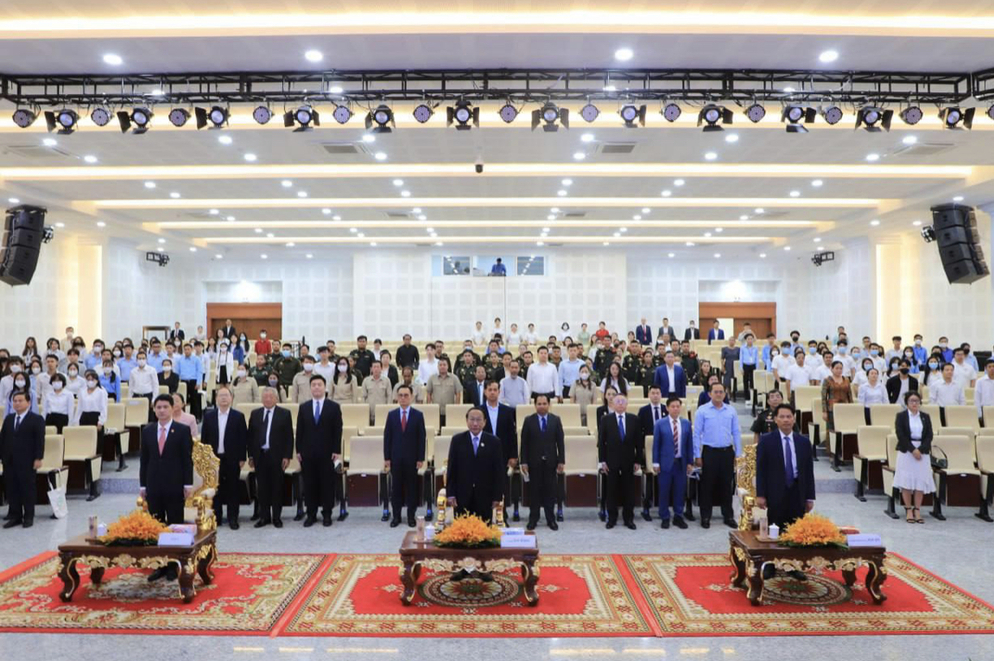
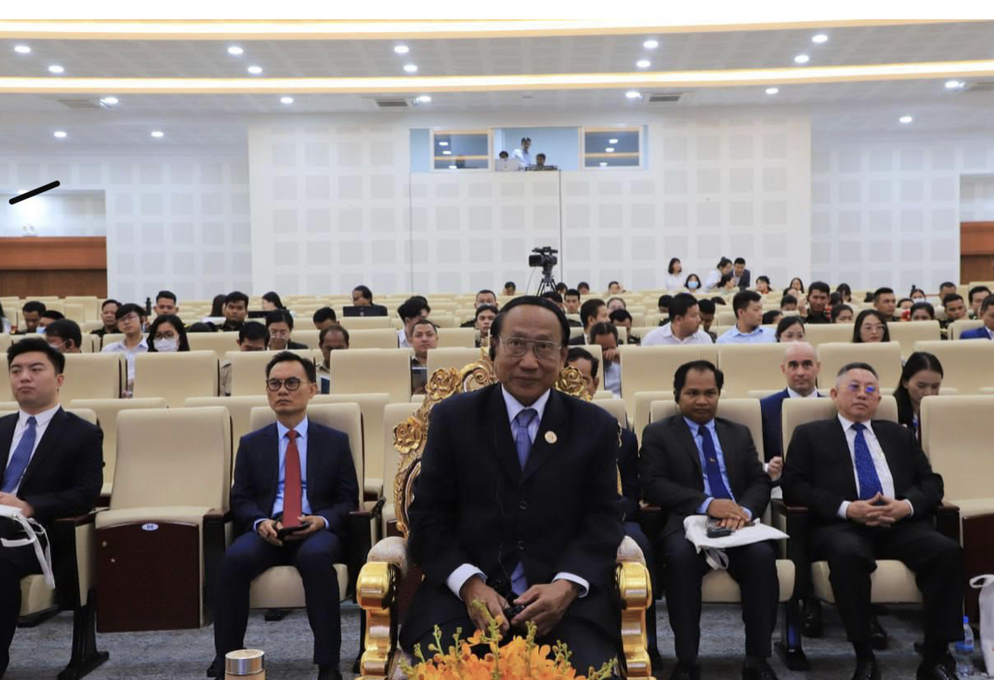
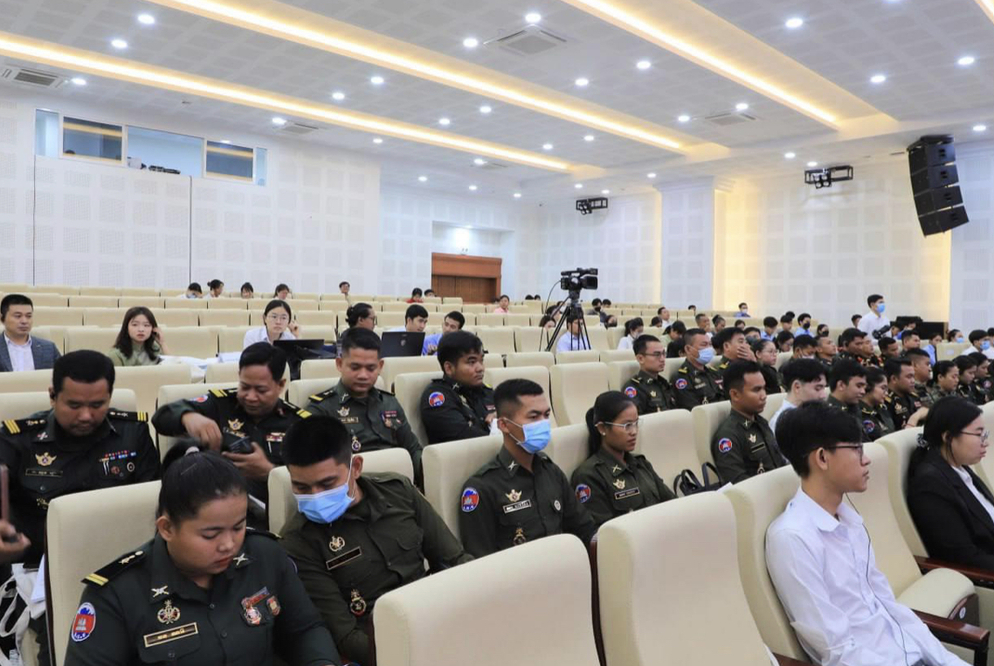
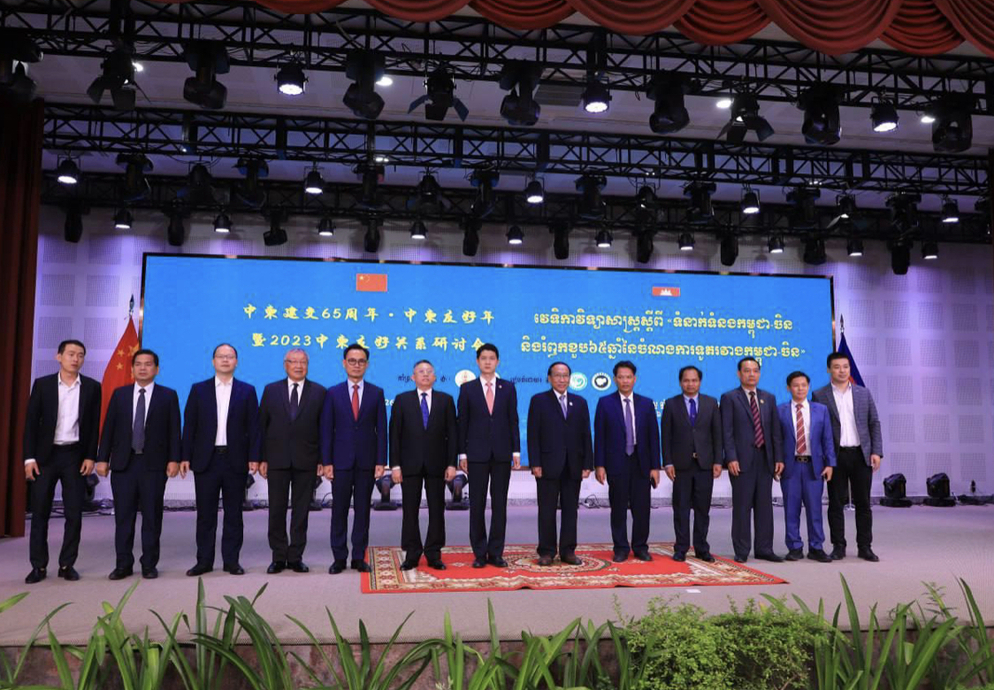
RAC Media | លឹម សុវណ្ណរិទ្ធ
ប្រភព៖ រូបភាព Fresh News
 ថ្ងៃសៅរ៍, 27 ឧសភា 2023 ម៉ោង 11:17 AM
ថ្ងៃសៅរ៍, 27 ឧសភា 2023 ម៉ោង 11:17 AM
ព្រះសិទ្ធត្ថកុមារ ដែលក្រោយមកមនុស្សជាច្រើនស្គាល់ថា ព្រះពុទ្ធ គឺជាបុត្រានៃមហាក្សត្រនៃប្រទេសឥណ្ឌាបុរាណ ដែលត្រូវស្នងរាជ្យសម្បត្តិបន្តពីព្រះវរបិតា។ ទោះបី បិតាខំប្រឹងប្រើប្រាស់មធ្យោបាយគ្រប់បែបយ៉ាងដើម្បីរៀបចំជីវិតបុត្រារូបនេះ ឲ្យពេញចិត្តនិងរាជសម្បត្តិដ៏ស្ដុកស្ដម្ភយ៉ាងណាក៏ដោយ ក៏ព្រះអង្គមិនទទួលយកជីវិតបែបនេះឡើយ។ ព្រះអង្គបានចាកចេញពីរាជវាំង ប្រពន្ធកូន ស្រីស្នំ និងទ្រព្យទាំងឡាយ ទៅបួសជាសមណ ដើម្បីសិក្សាស្វែងរកការពិតនៃជីវិត។ ព្រះអង្គបានរកឃើញទស្សនៈស្ដីពីជីវិតតាមរយៈ ចតុរារិយសច្ចៈ។ ធម៌ដែលព្រះពុទ្ធបានត្រាស់ដឹង អាចជួយមនុស្សទាំងឡាយយកទៅប្រតិបត្តិក្នុងជីវិតប្រចាំថ្ងៃបានល្អប្រសើរយ៉ាងពិតប្រាកដ នៅគ្រប់សម័យកាល។
សូមចូលអានខ្លឹមសារលម្អិត និងមានអត្ថបទស្រាវជ្រាវជាច្រើនទៀតតាមរយៈតំណភ្ជាប់ដូចខាងក្រោម៖
http://rac.gov.kh/researchs-categories/1/researchs?page=6
 ថ្ងៃព្រហស្បតិ៍, 25 ឧសភា 2023 ម៉ោង 03:05 PM
ថ្ងៃព្រហស្បតិ៍, 25 ឧសភា 2023 ម៉ោង 03:05 PM
(រាជបណ្ឌិត្យសភាកម្ពុជា)៖ នៅរសៀលថ្ងៃអង្គារ ៤ កើត ខែជេស្ឋ ឆ្នាំថោះ ព.ស. ២៥៦៧ ត្រូវនឹងថ្ងៃទី២៣ ខែឧសភា ឆ្នាំ២០២៣ ឯកឧត្ដម Justin Whyatt ឯកអគ្គរាជទូតអូស្ត្រាលីប្រចាំព្រះរាជាណាចក្រកម្ពុជាអញ្ជើញទស្សនកិច្ចនៅរាជបណ្ឌិត្យសភាកម្ពុជា និងបានជួបពិភាក្សា និងផ្លាស់ប្ដូរទស្សនៈជាមួយនឹងឯកឧត្ដមបណ្ឌិត យង់ ពៅ និងថ្នាក់ដឹកនាំវិទ្យាស្ថាននៃរាជបណ្ឌិត្យសភាកម្ពុជា។
នៅក្នុងឱកាសជំនួបដ៏មានសារៈសំខាន់នាឱកាសនេះ ឯកឧត្ដមអគ្គរាជទូតអូស្ត្រាលី និងឯកឧត្ដមបណ្ឌិត យង់ ពៅ អគ្គលេខាធិការរាជបណ្ឌិត្យសភាកម្ពុជា ព្រមទាំងថ្នាក់ដឹកនាំវិទ្យាស្ថាននៃរាជបណ្ឌិត្យសភាកម្ពុជា បានផ្លាស់ប្ដូរទស្សនៈជាមួយគ្នាជុំវិញទំនាក់ទំនងកម្ពុជា-ចិន ទំនាក់ទំនងកម្ពុជា-អូស្ត្រាលី និងបញ្ហាក្នុងតំបន់ជាដើម។
ថ្លែងនៅក្នុងជំនួបនារសៀលនេះ ឯកឧត្ដមបណ្ឌិត យង់ ពៅ បានវាយតម្លៃខ្ពស់ចំពោះទំនាក់ទំនងទ្វេភាគី កម្ពុជា-អូស្ត្រាលីថា ក្នុងប្រវត្តិទំនាក់ទំនងក្នុងសម័យទំនើប សម្រាប់ប្រទេសកម្ពុជា អូស្ត្រាលីពិតជាមានតួនាទីសំខាន់ណាស់រាប់ចាប់តាំងពីដំណើរការស្វែងរកសន្តិភាព និងដល់ការអភិវឌ្ឍប្រទេសជាតិរហូតមកដល់បច្ចុប្បន្ន។ អូស្ត្រាលីជាប្រទេសហត្ថលេខីនៃកិច្ចព្រមព្រៀងទីក្រុងប៉ារីស ហើយអូស្ត្រាលីបានចូលរួមជួយដល់ការអភិវឌ្ឍកម្ពុជាទាំងជំនួយជាហេដ្ឋារចនាសម្ព័ន្ធ និងការអភិវឌ្ឍធនធានមនុស្ស។ ឯកឧត្ដមបណ្ឌិតបន្តថា អូស្ត្រាលីនៅក្នុងផ្នត់គំនិតរបស់ប្រជាជនកម្ពុជា សុទ្ធតែមានរូបភាពវិជ្ជមាននៅគ្រប់ចំណុច។ បន្ថែមពីនេះ ឯកឧត្ដមបណ្ឌិត យង់ ពៅ បានគូសបញ្ជាក់អំពីលទ្ធភាពនៃការធ្វើកិច្ចសហប្រតិបត្តិការរវាងធនាគារខួរក្បាលប្រទេសទាំងពីរ ដែលវាពិតជាមានសារៈសំខាន់ខ្លាំងណាស់ ដោយអ្នកសិក្សាស្រាវជ្រាវនៃប្រទេសទាំងពីរអាចរួមគ្នាគិតគូរនិងសិក្សាស្រាវជ្រាវរួមគ្នាអំពីបញ្ហានានា ឬការផ្លាស់ប្ដូរណាមួយនៅក្នុងតំបន់នាពេលអនាគតបាន។
ឯកឧត្ដម Justin Whyatt ឯកអគ្គរាជទូតអូស្ត្រាលីប្រចាំព្រះរាជាណាចក្រកម្ពុជា បានថ្លែងយល់ស្របជាមួយនឹងប្រសាសន៍លើកឡើងរបស់ឯកឧត្ដមបណ្ឌិតអគ្គលេខាធិការ និងបានជម្រាបជូនឯកឧត្ដមបណ្ឌិត យង់ ពៅ ថា ឯកឧត្ដមបានស្វែងយល់អំពីតួនាទី បេសកកម្ម និងរចនាសម្ព័ន្ធនៃរាជបណ្ឌិត្យសភាកម្ពុជាដោយផ្ទាល់។ បន្ថែមពីនេះ នៅក្នុងឱកាសអញ្ជើញមកកាន់រាជបណ្ឌិត្យសភាកម្ពុជានារសៀលនេះ ឯកឧត្ដមឯកអគ្គរដ្ឋទូតបានអញ្ជើញធ្វើទស្សនកិច្ចពិនិត្យស្ថានភាពបំពេញការងារនៅតាមវិទ្យាស្ថាននានា ព្រមទាំងបានផ្ដោតចាប់អារម្មណ៍ទៅលើវិទ្យាស្ថានជីវសាស្ត្រ វេជ្ជសាស្ត្រ និងកសិកម្ម ដោយឯកឧត្ដមមានបំណងស្វែងរកកិច្ចសហប្រតិបត្តិការ ក៏ដូចជាការផ្លាស់ប្ដូរទស្សនៈគ្នាបន្ថែមទៀត នាពេលអនាគតជាមួយនឹងរាជបណ្ឌិត្យសភាកម្ពុជា នៅក្នុងវិស័យកសិកម្ម និងសុខាភិបាល។
ជាការឆ្លើយតប ឯកឧត្ដមបណ្ឌិតអគ្គលេខាធិការរាជបណ្ឌិត្យសភាកម្ពុជាបានថ្លែងសេចក្ដីសោមនស្សចំពោះបំណងនេះ និងឆន្ទៈដែលស្ថានទូតអូស្ត្រាលីប្រចាំកម្ពុជា ចង់បន្តកិច្ចសហប្រតិបត្តិការជាមួយគ្នាបន្ថែមទៀត។ បន្ថែមពីលើនេះ ឯកឧត្ដមបណ្ឌិតក៏បានជម្រាបជូនឯកឧត្ដមឯកអគ្គរដ្ឋទូតផងដែរអំពី លទ្ធភាពនៃកិច្ចសហប្រតិបត្តិការលើវិស័យសិក្សាស្រាវជ្រាវ និងការរៀបចំកិច្ចពិភាក្សាតុមូលរួមគ្នាបន្តទៀត ព្រមទាំងបានគូសបញ្ជាក់អំពីសក្ដានុពលដែលស្ថានទូតអូស្ត្រាលីអាចធ្វើកិច្ចសហប្រតិបត្តិការក្នុងវិស័យកសិកម្មជាមួយរាជបណ្ឌិត្យសភាកម្ពុជា នៅឯឧទ្យានរាជបណ្ឌិត្យសភាកម្ពុជា តេជោសែន ឫស្សីត្រឹប ដែលស្ថិតនៅក្នុងឃុំឆែប១ ឆែប២ ស្រុកឆែប ខេត្តព្រះវិហារ ដែលបច្ចុប្បន្នកំពុងអនុវត្តគម្រោងចិញ្ចឹមគោទឹកដោះ គោសាច់ ក្របី ចៀម និងពពែជាដើម-ល-៕
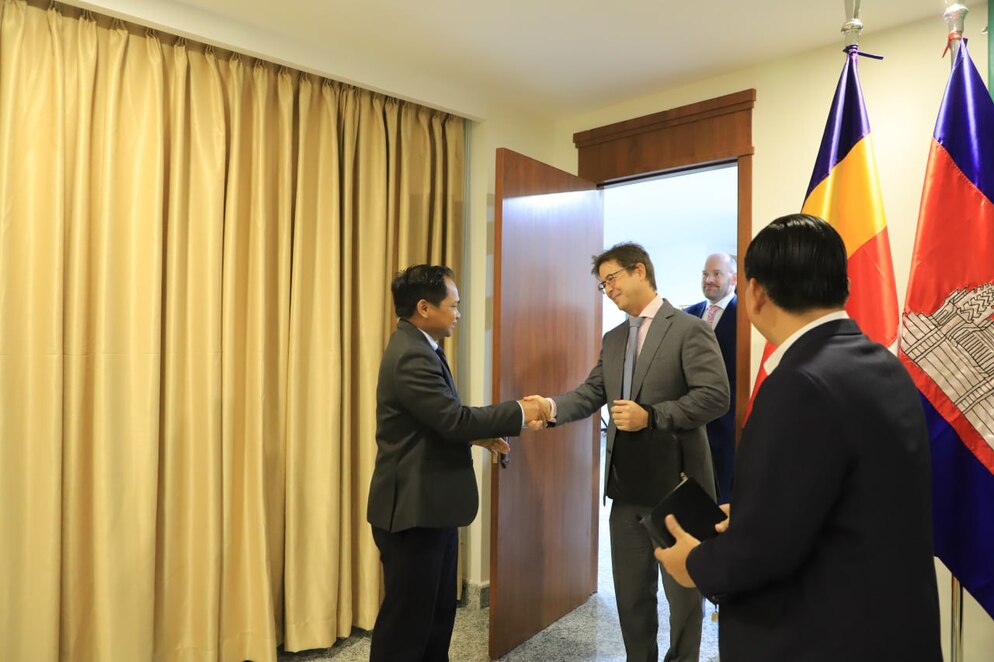
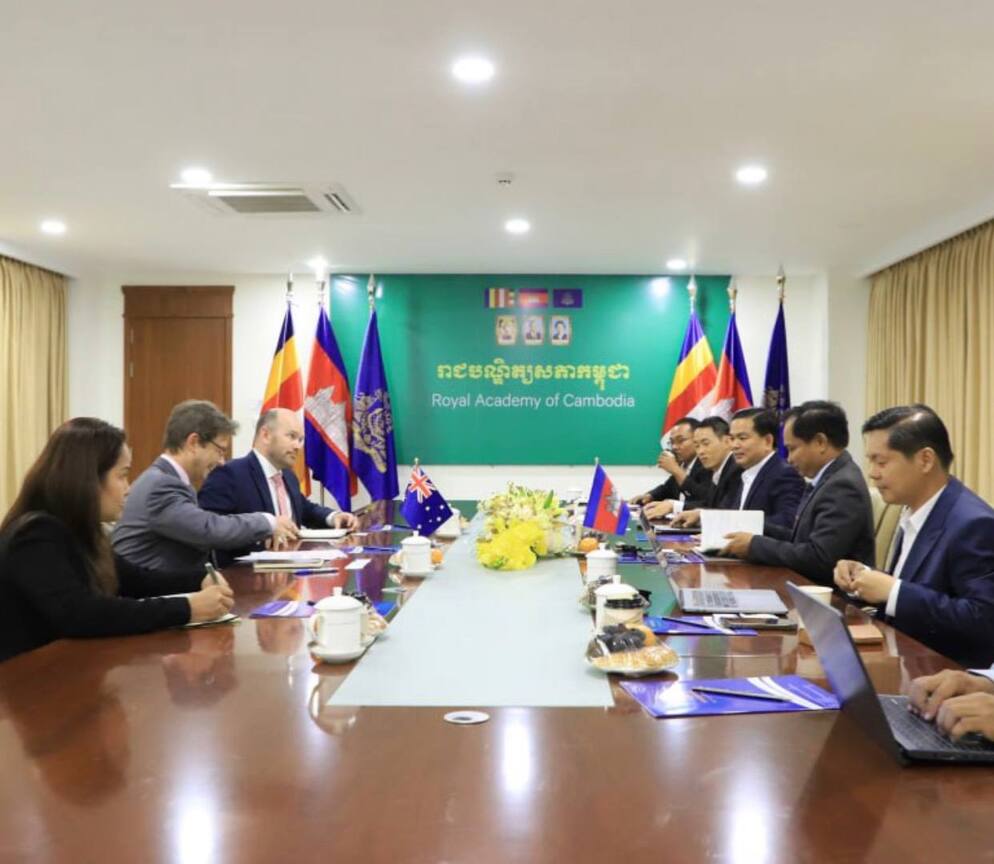
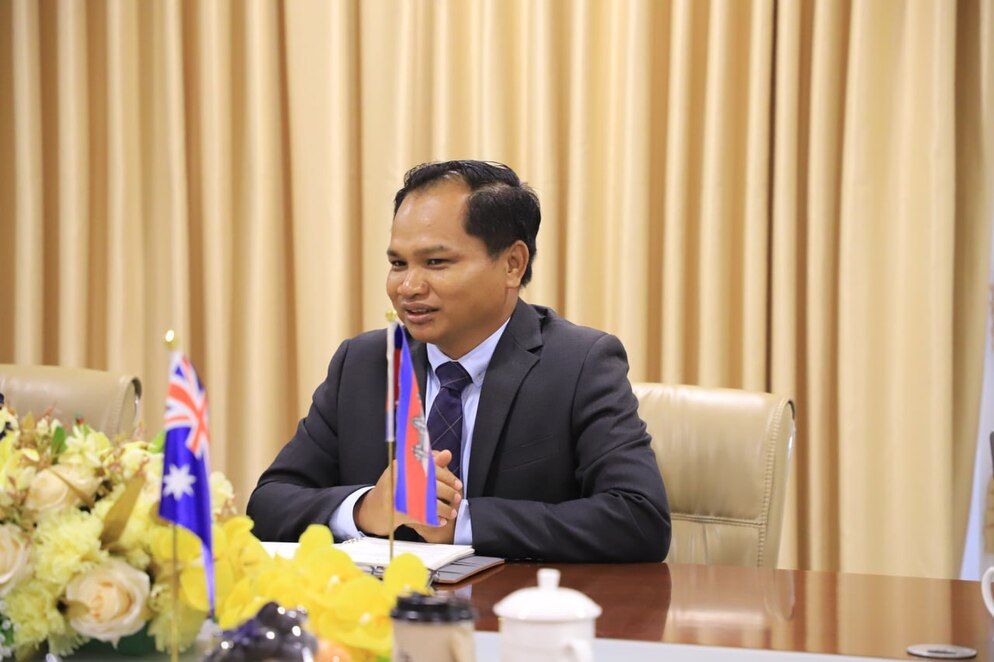
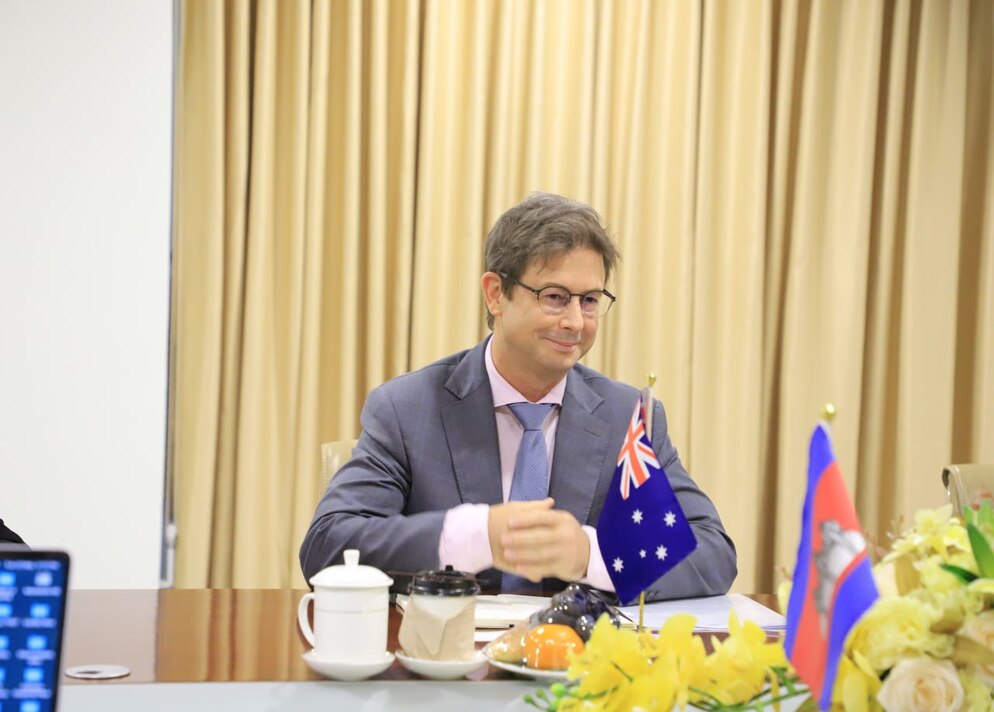
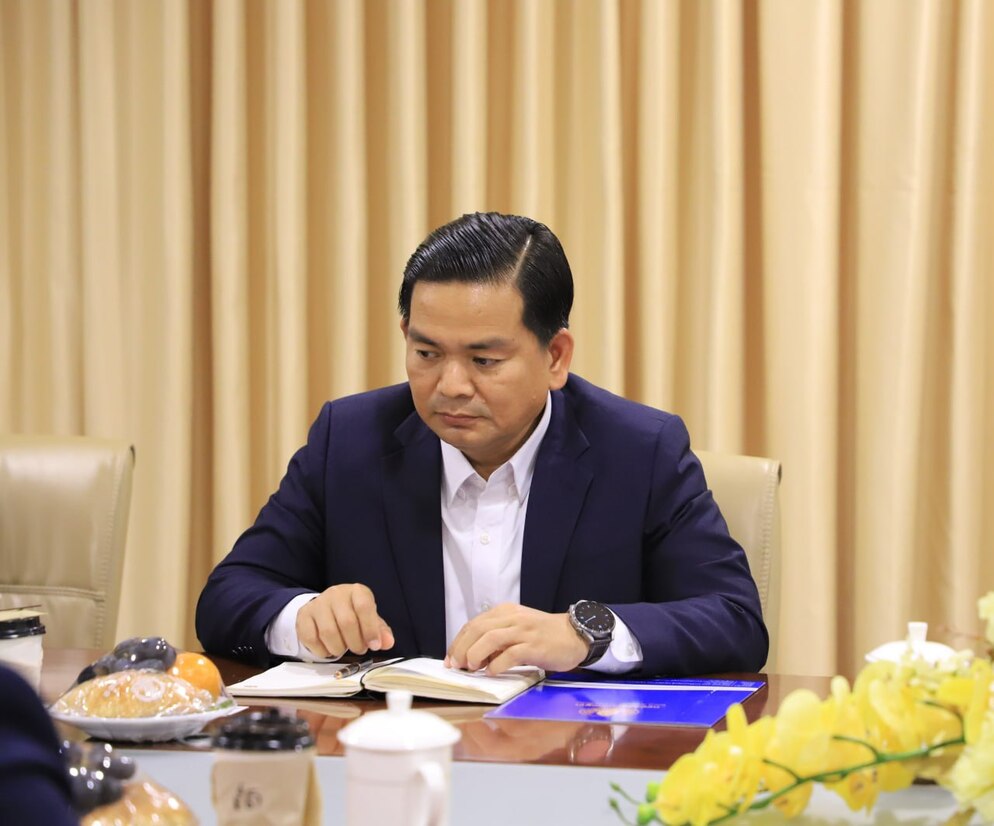

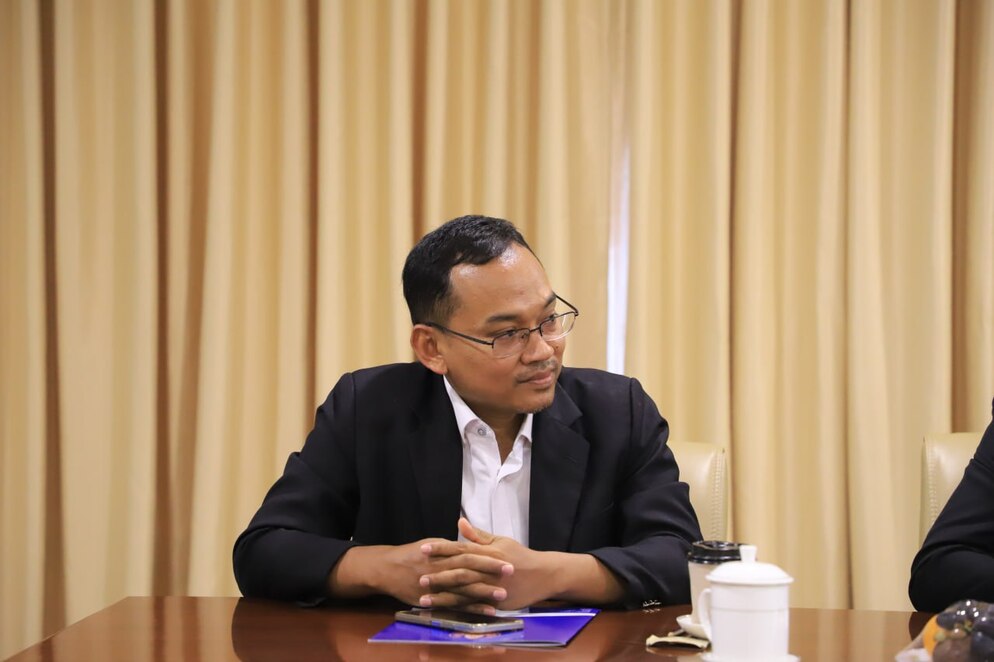
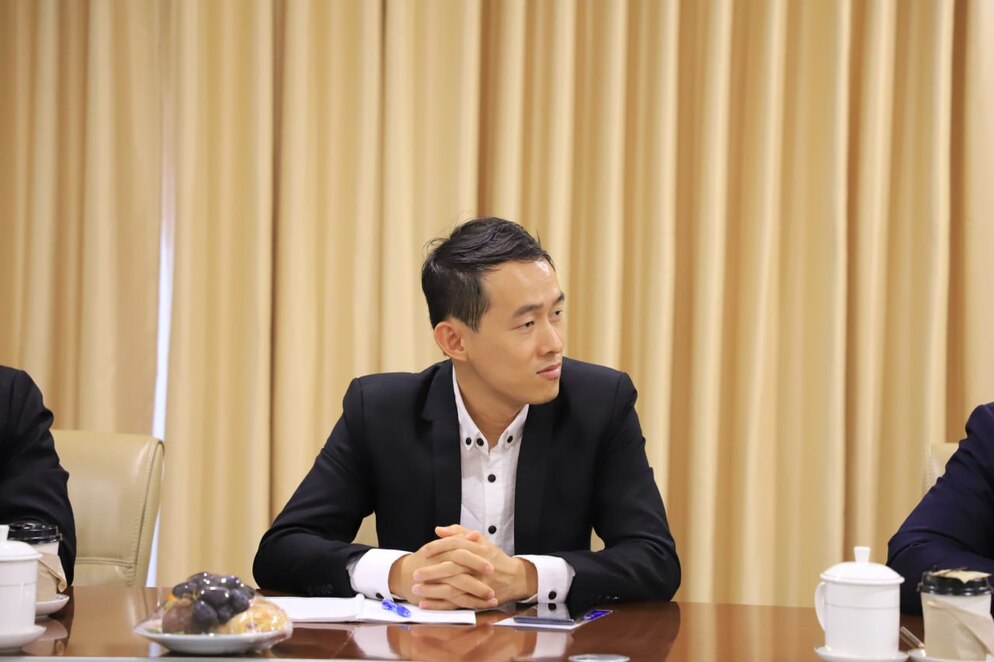
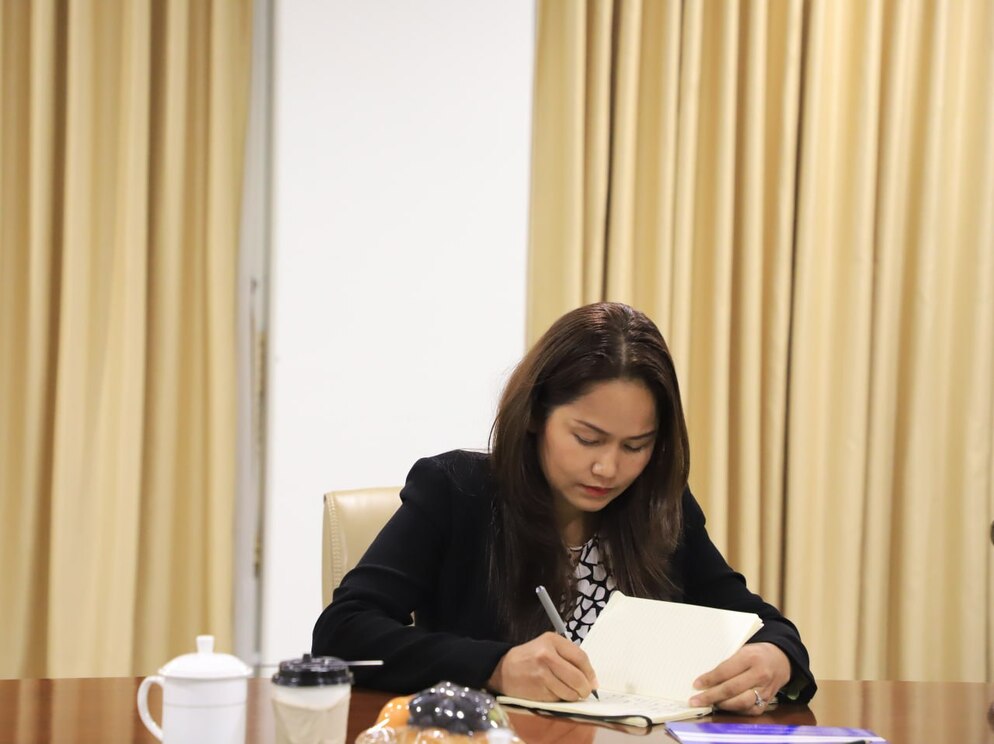
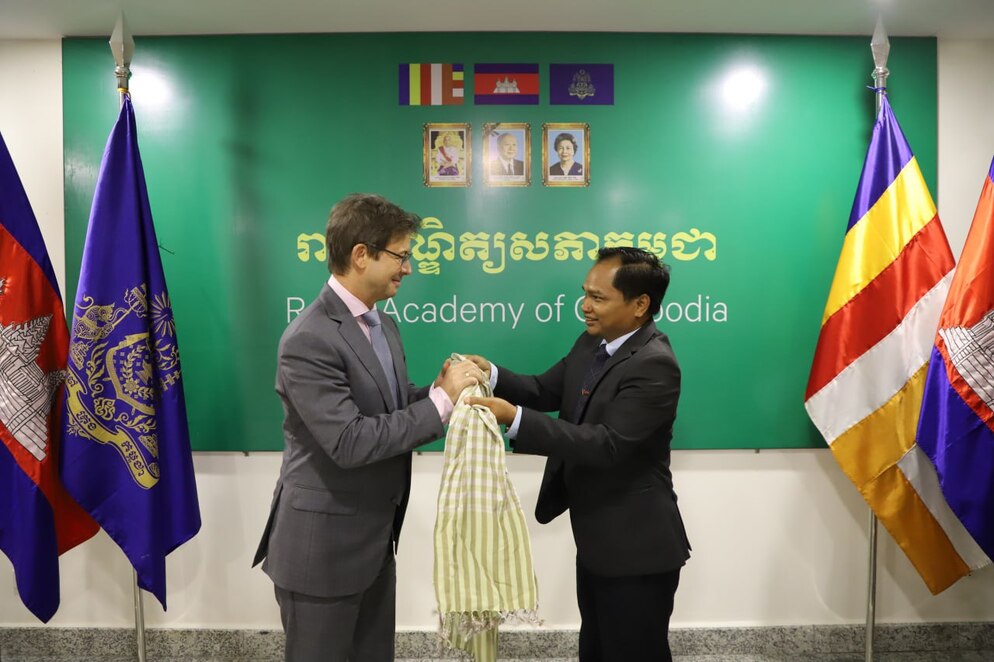
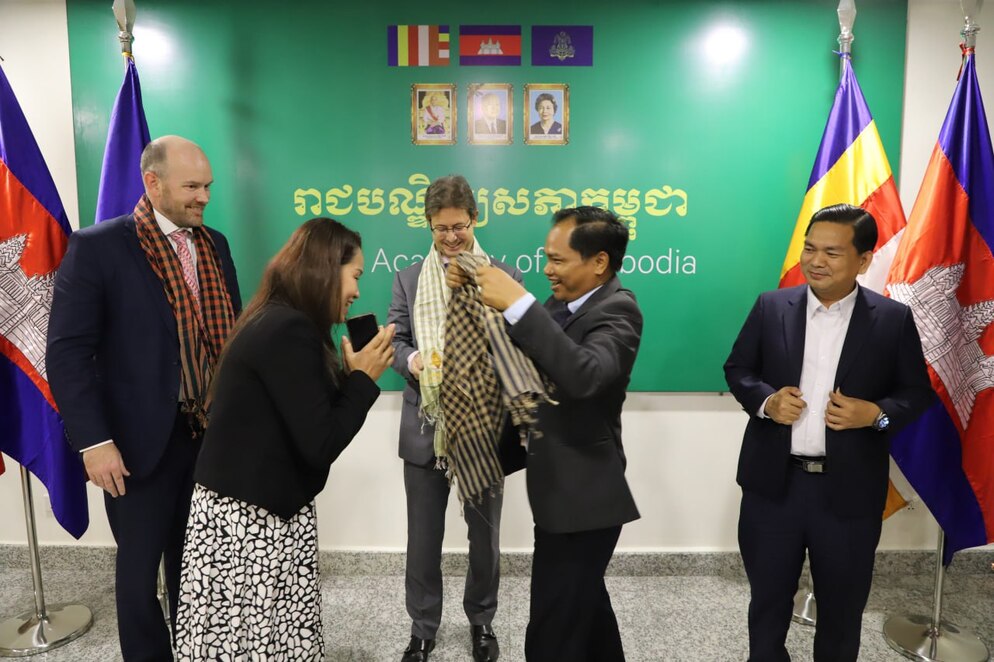
RAC Media | លឹម សុវណ្ណរិទ្ធ
 ថ្ងៃអង្គារ, 23 ឧសភា 2023 ម៉ោង 08:14 PM
ថ្ងៃអង្គារ, 23 ឧសភា 2023 ម៉ោង 08:14 PM
(រាជបណ្ឌិត្យសភាកម្ពុជា)៖ បន្ទាប់ពី ព្រំដែននៅ តំបន់ ប្រាសាទ វិហារ ត្រូវបាន បិទអស់រយៈ ពេល ១៥ ឆ្នាំ រាប់ចាប់តាំងពីឆ្នាំ២០០៨ ដែល កងទ័ព នៃប្រទេសទាំងពីរបាន ប៉ះទង្គិចគ្នា ដោយអាវុធរួចមក ច្រកចូលត្រង់ពីខាងទឹកដីថៃមកកាន់ប្រាសាទព្រះវិហារត្រូវបានបិទទាំងស្រុង។
នៅរសៀលថ្ងៃទី២២ ខែឧសភា ឆ្នាំ២០២៣នេះ បន្ទាប់ពីទទួលព័ត៌មានពីកាសែតបាងកកប៉ុស្តិ៍ ដែលបានលើកឡើងពីបំណងដែលថៃស្នើសុំបើកច្រកចូលត្រង់មកប្រាសាទព្រះវិហារ ឯកឧត្ដមបណ្ឌិតសភាចារ្យ សុខ ទូច ប្រធានរាជបណ្ឌិត្យសភាកម្ពុជា បានបង្ហាញទស្សនៈយល់ឃើញផ្ទាល់របស់ឯកឧត្ដមថា កម្ពុជាពុំមានភាពចាំបាច់ត្រូវបើកច្រកចូលត្រង់មកប្រាសាទព្រះវិហារពីក្នុងទឹកដីថៃនោះឡើយ ដោយឯកឧត្ដមបណ្ឌិតសភាចារ្យបានគូសបញ្ជាក់ហេតុផលសំខាន់ៗចំនួន៣។
បើតាមឯកឧត្ដមបណ្ឌិតសភាចារ្យ ហេតុផលទីមួយនោះគឺ ករណីប្រាសាទព្រះវិហារ គឺជាការជាន់ដានប្រវត្តិសាស្ត្រដដែលៗ ដែលភាគីថៃតែងតែចិញ្ចឹមចិត្តថា ប្រាសាទព្រះវិហារជារបស់ខ្លួន ដោយកន្លងមក ថៃធ្លាប់បានបង្វែរបញ្ហានយោបាយផ្ទៃក្នុងរបស់ខ្លួនទៅជាចរន្តជាតិនិយម ដោយយកបញ្ហាប្រាសាទព្រះវិហារជាគោលដៅរួចមកហើយ។ ឯកឧត្ដមបណ្ឌិតសភាចារ្យ បានគូសបញ្ជាក់បន្ថែមថា «ជាក់ស្ដែង ខ្ញុំបានចងចាំព្រឹត្តិការណ៍ឆ្នាំ២០០៨យ៉ាងច្បាស់ ដែលកាលណោះ ខ្ញុំបានឱ្យមន្ត្រីរបស់ខ្ញុំឡើងចងបដា ប៉ុន្តែគ្មាននរណាហ៊ានឡើងចងឡើយ ចុងក្រោយខ្ញុំបានសម្រេចចិត្តឡើងចងបដាដោយខ្លួន ឯងផ្ទាល់»។
ចំណែកហេតុផលទីពីរ ត្រូវបានឯកឧត្ដមបណ្ឌិតសភាចារ្យ សុខ ទូច ពន្យល់ថា ការធ្វើដូចនេះ(ការបើកច្រកចូលប្រាសាទព្រះវិហារពីខាងថៃ) កម្ពុជានឹងអាចបាត់បង់ភ្ញៀវទេសចរដែលគេត្រូវមកស្នាក់អាស្រ័យនៅក្នុងប្រទេស កម្ពុជា ព្រោះប្រសិនបើកម្ពុជាឯកភាពក្នុងការបើកច្រកនេះ ភ្ញៀវទេសចរនឹងទៅស្នាក់អាស្រ័យនៅក្នុងប្រទេសថៃ ដែលធ្វើឱ្យកម្ពុជាបាត់បង់ចំណូលមួយផ្នែករបស់ខ្លួន ពីភ្ញៀវទេសចរដែលមានបំណងមកទស្សនាប្រាសាទព្រះវិហារ។
រីឯហេតុផលសំខាន់ទីបីនោះគឺ ក្នុងពេលដែលភ្ញៀវទេសចរបរទេសសម្រេចចិត្តទៅស្នាក់នៅក្នុងប្រទេសថៃ ក្នុងគោល ដៅធ្វើដំណើរមកទស្សនាប្រាសាទព្រះវិហារ គេនឹងបរិភោគតែផលិតផលផលិតនៅក្នុងស្រុកថៃ។ ត្រង់ចំណុចនេះ ត្រូវបានឯកឧត្ដមបណ្ឌិតសភាចារ្យប្រធានរាជបណ្ឌិត្យសភាពន្យល់ថា កាលណាភ្ញៀវទេសចរស្នាក់នៅក្នុងប្រទេសថៃ គេបរិភោគតែអាហារនិងផលិតផលរបស់ថៃ នោះកម្ពុជានឹងខាតបង់នូវអត្ថប្រយោជន៍មួយបន្ថែមទៀតគឺ ឱកាសដែលកម្ពុជាអាចបង្ហាញនូវផលិតផលរបស់ខ្លួនដល់ភ្ញៀវទេសចរ៕
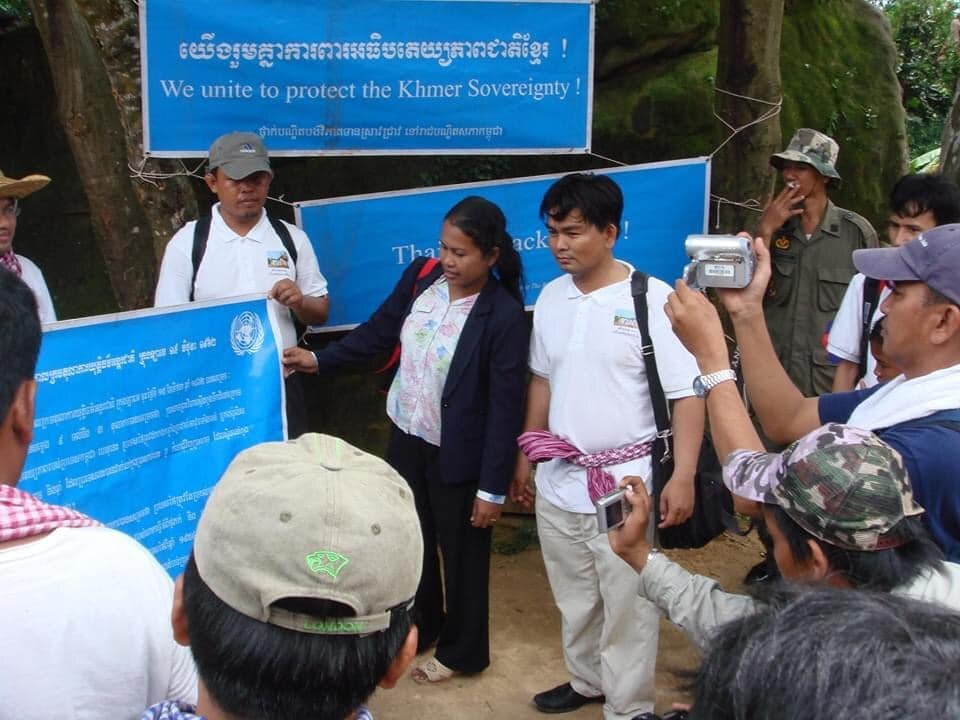
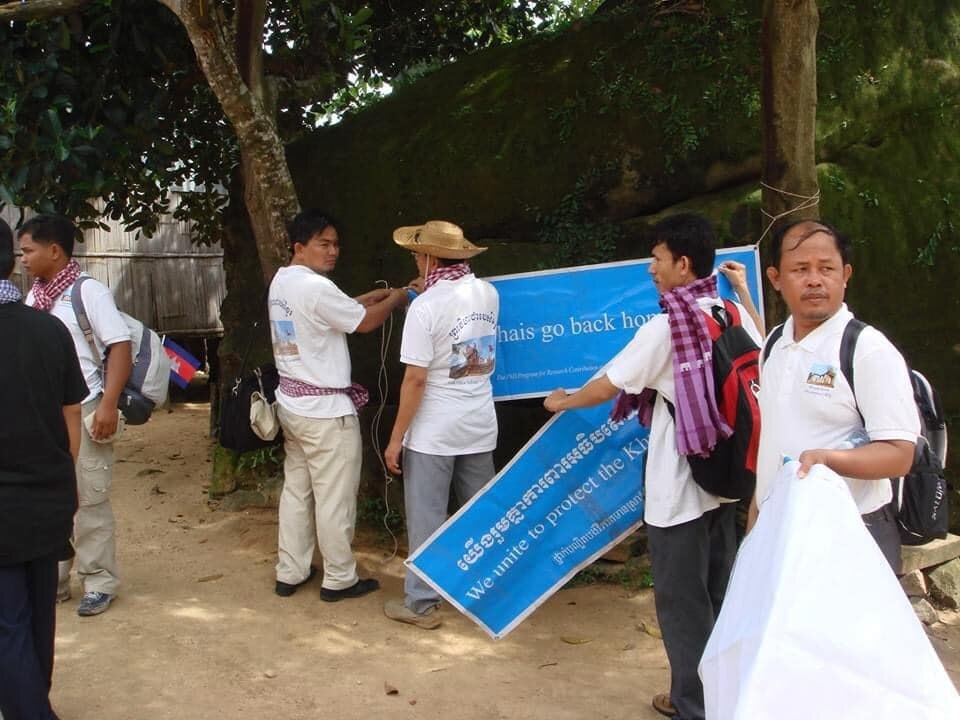
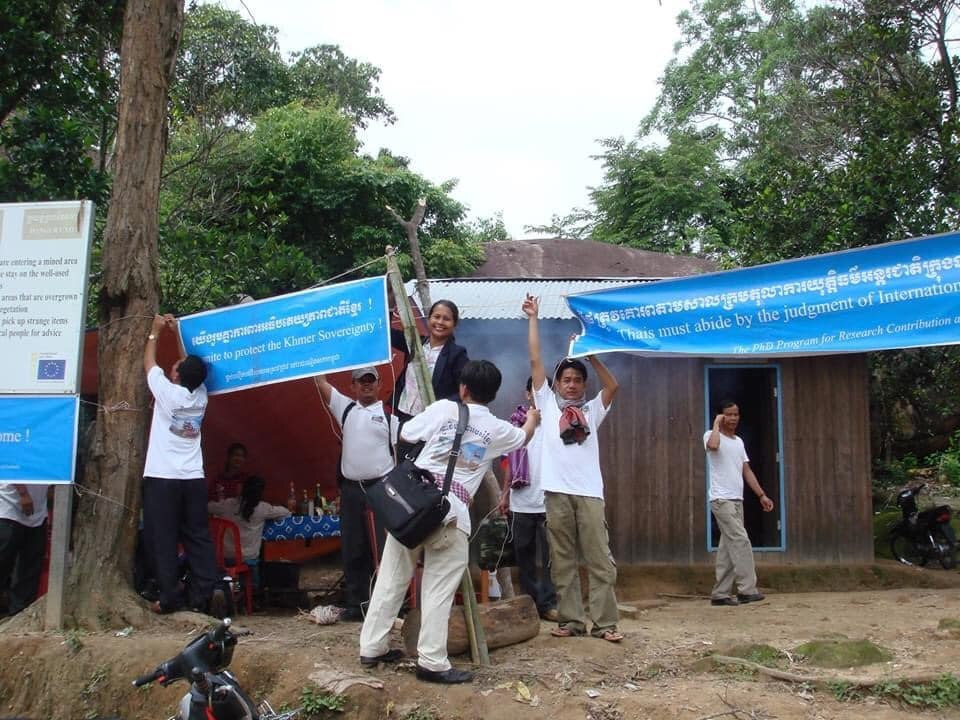
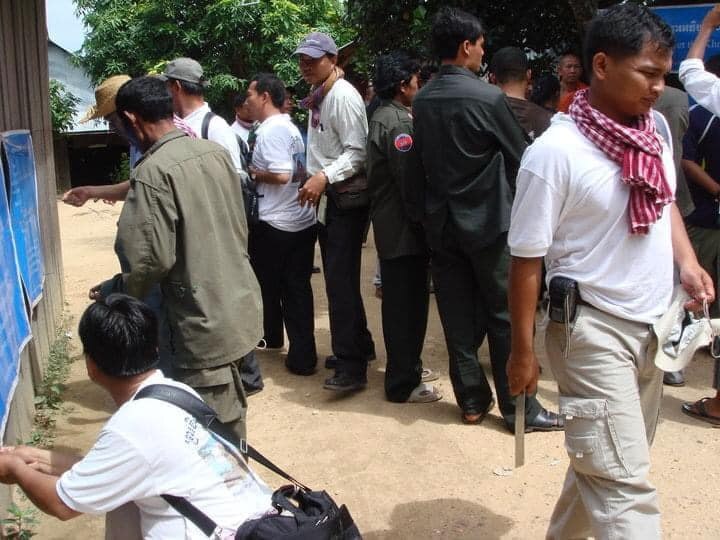
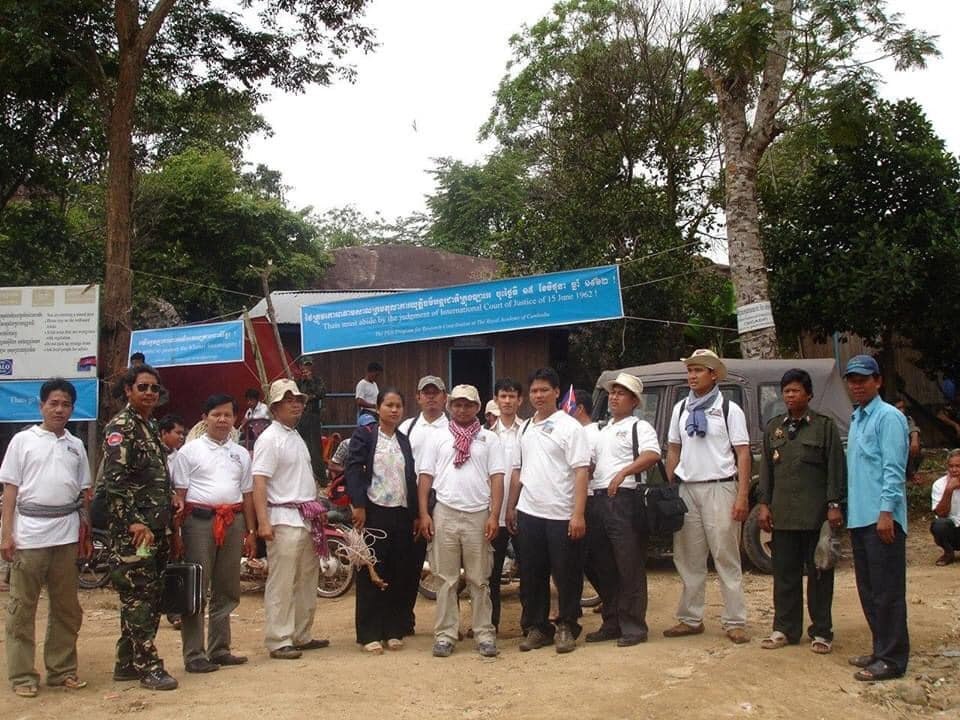
RAC Media
 ថ្ងៃអង្គារ, 23 ឧសភា 2023 ម៉ោង 03:11 PM
ថ្ងៃអង្គារ, 23 ឧសភា 2023 ម៉ោង 03:11 PM
សៀវភៅ ស្តីអំពី ការសិក្សាទ្រឹស្តីដេរីវេនៃអនុគមន៍ Study of Derivative Theory of Functions ភាគ១ ឆ្នាំ២០២៣ នេះ នឹងសិក្សាអំពីសេចក្តីផ្តើម និងបញ្ញត្តិមូលដ្ឋាននៃដេរីវេដូចជា លីមីតនៃអនុគមន៍ ដេរីវេនៃអនុគមន៍ និងរូបមន្តដេរីវេ។...
សូមចូលអានសៀវភៅ និងមានអត្ថបទស្រាវជ្រាវច្រើនទៀតតាមរយៈតំណភ្ជាប់ដូចខាងក្រោម៖
http://rac.gov.kh/researchs-categories/16/researchs?page=2
 ថ្ងៃអាទិត្យ, 21 ឧសភា 2023 ម៉ោង 02:36 PM
ថ្ងៃអាទិត្យ, 21 ឧសភា 2023 ម៉ោង 02:36 PM
សេចក្ដីជូនដំណឹង ស្តីពី"ការអញ្ជើញចូលរួមដេញថ្លៃ ការផ្គត់ផ្គង់ប្រេងឥន្ធនៈប្រចាំឆ្នាំ២០២៤ សម្រាប់ជរាជបណ្ឌិត្យសភាកម្ពុជា ចាប់ពីថ្ងៃទី១៨ មេសា ឆ្នាំ២០២៤។ *ចាប់ទទួលលក់ពាក្យដេញថ្លៃពីថ្ងៃនេះតទៅ រហូតដល់ថ្ងៃទី១៨ ខែមេសា ឆ្នាំ២០២៤ វេលាម៉ោង ១០.៣០នាទីព្រឹក។ ទូរសព្ទទំនាក់ទំនង : ០២៣ ៨៩០ ១៨០។
ថ្ងៃចន្ទ, 08 មេសា 2024 ម៉ោង 02:35 PM
សេចក្ដីជូនដំណឹង ស្តីពីការ ចូលរួមដេញថ្លៃ ផ្គត់ផ្គង់សម្ភារៈអេឡិចត្រូនិកសម្រាប់រាជបណ្ឌិត្យសភាកម្ពុជា ចាប់ពីថ្ងៃទី៥ មិថុនា ឆ្នាំ២០២៣។ *កាលបរិច្ឆេទឈប់ទទួលពាក្យដេញថ្លៃ៖ ថ្ងៃទី៣០ ខែមិថុនា ឆ្នាំ២០២៣ វេលាម៉ោង ១០.៣០នាទីព្រឹក។ ទូរសព្ទទំនាក់ទំនង : 012 78 36 46។
ថ្ងៃសុក្រ, 02 មិថុនា 2023 ម៉ោង 09:21 PM
វគ្គសិក្សាថ្មី សម្រាប់ឆ្នាំសិក្សាថ្មី ឆ្នាំ២០២២-២០២៣ ! សម្រាប់ថ្នាក់បរិញ្ញាបត្រជាន់ខ្ពស់ និងថ្នាក់បណ្ឌិត នៅរាជបណ្ឌិត្យសភាកម្ពុជា ចាប់ផ្តើមទទួលចុះឈ្មោះហើយ.... ព័ត៌មានលម្អិត សូមទាក់ទងមជ្ឈមណ្ឌលបណ្តុះបណ្តាលនិងស្រាវជ្រាវនៃរាជបណ្ឌិត្យសភាកម្ពុជា (អគារឥន្រ្ទទេវី) ឬតាមរយៈទូរសព្ទ៖ 067-811-667 / 010-268-797 / 099-238-677 / 097 728 4444
ថ្ងៃចន្ទ, 22 សីហា 2022 ម៉ោង 03:11 PM